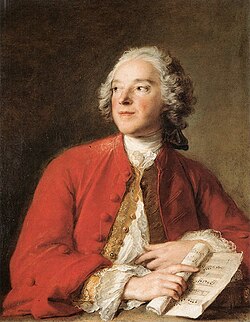Pierre-Augustin Caron de Beaumarchais | |
|---|---|
 Portrait by Jean-Marc Nattier, c. 1755 | |
| Born | Pierre-Augustin Caron 24 January 1732 Paris, France |
| Died | 18 May 1799 (aged 67) Paris, France |
| Resting place | Père Lachaise Cemetery |
| Nationality | French |
| Period | Age of Enlightenment, France |
| Genre | Plays; comedy and drama |
| Notable works | Le Barbier de Séville, Le Mariage de Figaro, La Mère coupable |
| Signature | |
Pierre-Augustin Caron de Beaumarchais ([pjeʁ(oɡystɛ̃ kaʁɔ̃ də) bomaʁʃɛ]; 24 January 1732 – 18 May 1799)[1] was a French polymath. At various times in his life, he was a watchmaker, inventor, playwright, musician, diplomat, spy, publisher, horticulturist, arms dealer, satirist, financier and revolutionary (both French and American).
Born a Parisian watchmaker's son, Beaumarchais rose in French society and became influential in the court of Louis XV as an inventor and music teacher. He made a number of important business and social contacts, played various roles as a diplomat and spy, and had earned a considerable fortune before a series of costly court battles jeopardized his reputation.
An early French supporter of American independence, Beaumarchais lobbied the French government on behalf of the American rebels during the American War of Independence. Beaumarchais oversaw covert aid from the French and Spanish governments to supply arms and financial assistance to the rebels in the years before France's formal entry into the war in 1778. He later struggled to recover money he had personally invested in the scheme.[2] Beaumarchais was also a participant in the early stages of the 1789 French Revolution.
Beaumarchais is probably best known for his theatrical works, especially the three Figaro plays.
- ^ He died during the evening of 17–18 May (Morton & Spinelli 2003, p. 315); the date 18 May is most frequently seen in sources.
- ^ "H. Rept. 18-64 - Report of the select committee, to whom was referred the message of the President of the United States in relation to the representatives of the late Caron de Beaumarchais. February 16, 1824. Read: Ordered that it lie upon the table". GovInfo.gov. U.S. Government Printing Office. Retrieved 20 June 2023.